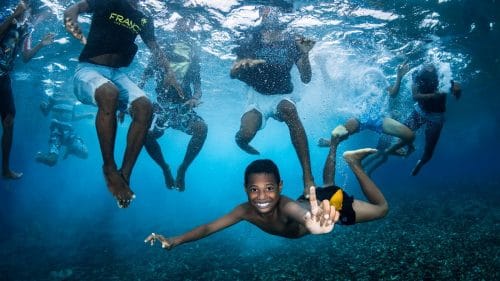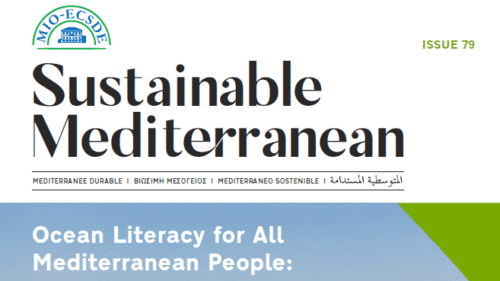What is the role of Ocean Literacy?

It would not be an exaggeration to say that the ocean is the beating heart of our world. Its balance and health are necessary for all kinds of life, human and non-human, to survive and thrive.
Water covers nearly two-thirds of the Earth, earning it the nickname of “blue planet.” The Pacific, Atlantic, Indian, Arctic, and Southern Ocean basins are the major divisions of the ocean, which holds 97 percent of all this water. In reality, the entire planet is connected by a vast body of water known as the Global Ocean.
This magnificent body of water not only provides us with food, jobs, life, and entertainment, but it also serves as a life support system for the planet, and it is critical that we comprehend its significance in our lives.
Ocean literacy is one of the most important projects we can all work on to spread the word on the importance of the ocean for all life on Earth, on the threats it faces, and on how we might learn to protect it in order to build a more sustainable future.
What is Ocean Literacy?
Ocean literacy is our capacity to understand how the ocean influence life, and in turn, how we influence the ocean. An ocean-literate person can:
- Understand essential principles and fundamental concepts related to the ocean;
- Communicate about the ocean in a meaningful and informed way;
- Make informed decisions regarding themes that impact the ocean.
Recognizing the lack of ocean-related disciplines in formal education, a group of ocean scientists and educators in the United States launched a bottom-up collaborative effort in 2002 to build a comprehensive framework to facilitate the integration of ocean sciences into national and state standards.
Ocean Literacy Through Science Standards, a two-week online program hosted by the College of Exploration in October 2004, drew roughly 100 people representing major constituencies for enhancing ocean literacy. The definition of ocean literacy and a set of principles were agreed upon at the end of this online session, which were later whittled down to the seven Essential Principles you’ll see below.
Here are the seven Ocean Literacy principles:
- Principle #1: The Earth has one big ocean with many features.
- Principle #2: The ocean and life in the ocean shape the features of Earth.
- Principle #3: The ocean has a major influence on weather and climate.
- Principle #4: The ocean makes the Earth habitable.
- Principle #5: The ocean supports a great diversity of life and ecosystems.
- Principle #6: The ocean and humans are inextricably interconnected.
- Principle #7: The ocean is largely unexplored.
Goals of Ocean Literacy
Ocean Literacy was created not only to educate and enlighten the public on the importance of the ocean, but also to encourage everyone’s responsible behaviour toward the ocean and its resources in order to work toward a more sustainable future.
The bulk of us go about our daily lives oblivious to how our activities affect the ocean and its well-being, just as we are oblivious to how the ocean affects ours.
Ocean Literacy projects aim to enhance community awareness and participation in the protection and restoration of our ocean, its inhabitants, and resources in order to promote the implementation of sustainable policies around the world.
The full list of all Ocean conferences updated to 2022
Here’s a list of important ocean-related conferences throughout the world, if you’re interested in learning more about the most current advancements in terms of new technology and regulations to clean up our ocean.
Gordon Research Seminar and Conference — Ocean Biogeochemistry
30 Apr 2022 – 06 May 2022 • Castelldefels, Spain
This Ocean Biogeochemistry Seminar and Conference offers a once-in-a-lifetime opportunity to share and discuss new findings and cutting-edge concepts. Complex mechanisms drive ocean dynamics, which are crucial for ecological resilience. The purpose of this conference is to do “fundamental and interdisciplinary biogeochemical research that is critical to developing a comprehensive understanding of our past, present, and future of the ocean.”
2022 Joint Aquatic Sciences Meeting
14 May 2022 – 22 May 2022 – Grand Rapids, Michigan, United States
“The world’s largest assembly of aquatic scientists, students, practitioners, resource agency employees, and industry representatives in history,” according to JASM (the Joint Aquatic Sciences Meeting).
Gordon Research Seminar and Conference — Ocean Mixing
04 Jun 2022 – 10 Jun 2022 – Mount Holyoke College, South Hadley, United States
During this conference, experts will examine the impact of ocean mixing on ocean and atmospheric systems, as well as on Earth and society in general.
Gordon Research Seminar and Conference — Ocean Global Change Biology
16 Jul 2022 – 22 Jul 2022 – Waterville Valley, United States
The theme of this forum will be “Integrating Environmental, Organismal, and Community Complexity into Ocean Global Change Research”.
UN Ocean Conference
27 Jun – 1 Jul 2022 – Lisbon, Portugal
The governments of Kenya and Portugal will co-host the UN Ocean Conference this year, with the goal of addressing many of the challenges raised by the COVID-19 pandemic. During the meeting, we’ll try to come up with significant structural changes and common answers.
7th International Marine Debris Conference (7IMDC)
18 Sep – 23 Sep 2022 – Busan, Republic of Korea
This is one of the world’s oldest international conferences on marine waste and plastic pollution. Governments, industry, scientists, and society will gather to discuss the latest research, facilitate cooperation, and come up with solutions to key global concerns.
ICEOE 2022 — The 5th International Conference on Environment and Ocean Engineering
21 Oct 2022 – 23 Oct 2022 – Shandong, China
ICEOE, one of the key venues for promoting and exchanging advancements in Environment and Ocean Engineering, is hosted by Shandong University. It will bring together world-renowned scientists and experts to address the most current topics in the field.
5th International Symposium on the Effects of Climate Change on the World’s Ocean
17-21 April 2023 – Bergen, Norway
ECCWO-5 brings together individuals from all over the world to learn more about the effects of climate change on ocean ecosystems and to discover viable adaptation and mitigation strategies. It also includes the latest current information on how our seas are changing, what is at risk, and how to adapt and work toward a more sustainable future.
References
https://ioc.unesco.org/our-work/ocean-literacy
https://oceanliteracyitalia.it/
https://oceanliteracy.unesco.org/?post-types=all&sort=popular
https://www.ecopdecade.org/ocean-literacy
https://www.marine-ed.org/ocean-literacy/overview
https://oceanconservationtrust.org/think-ocean/what-is-ocean-literacy/



